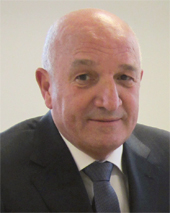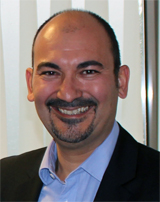 The question is, which leadership values and qualities will come to the fore this year. Here, seasoned channel leaders address today's leadership priorities, challenges, pitfalls and opportunities, and discuss leadership models that will successfully address the pressing issues.
The question is, which leadership values and qualities will come to the fore this year. Here, seasoned channel leaders address today's leadership priorities, challenges, pitfalls and opportunities, and discuss leadership models that will successfully address the pressing issues.
There was a time when leadership was about leading from the front and pulling the rest of the business along with you, but that's no longer the case, according to Martin St. Quinton (pictured), Non-Executive Chairman, Annodata. "You can't be an expert at everything and it's a big mistake to assume that you have all the right answers and fail to get input from the other stakeholders in your business, not least sales people on the front line speaking to clients day-in day-out," he commented. "If anyone is going to have a feel for the market and the 'mood music' it's them. Successful business leaders recognise that. They are good listeners and communicators, which ultimately helps them to make informed and considered decisions."
Every reseller comes from a different place and will have their own challenges to overcome. But something that no business leader in the channel can ignore is cloud computing, believes St. Quinton. "You need to work out what the opportunities and challenges that cloud presents are and how you are going to respond to them," he added. "Few, if any, resellers are going to be untouched by the cloud revolution. You either embrace it, no matter how taxing a process that may be, or have the rug pulled out from under you by a competitor that has beaten you to it and siphoned off your client base."
In such an environment it's doubly important to have a clear vision of where you want the company to go and to communicate that clearly and effectively throughout the entire business. "It's the only way to get results and get everyone moving towards the same goal," said St. Quinton. "Give all your key staff a stake in your business."
Good leadership skills take years to develop and what it means to be a good leader can change. "Anyone can make decisions, but it's ultimately about good judgement," said St. Quinton. "To have good judgement you've got to develop the skills and experience to understand what you're dealing with. Leadership is as much about knowing when to take risks and drive change as much as it is about knowing when to sit back and maintain the status quo."
A key priority for business leaders in the channel is maintaining focus, pointed out Elsa Chen, CEO, Entanet. "In the technology sector the greatest challenge for any leader is to not be distracted by noises about the 'next big thing'," she said. "The best leaders know when and how to maintain focus."
Another challenge is the balance between leading change and developing employees. It's a typical trait of business leaders to lead change, but this poses the challenge of bringing people on board and developing their capabilities to make the change happen. "The third key challenge is cash and investment," added Chen. "Investment needs to be made continually to address the ever-changing conditions in our industry. This can be for new technology, new systems, new skills or simply more staff.
"The market is fiercely competitive, margins are tight and growth is challenging, so it is easy to become a numbers driven leader and forget that what actually makes a great business is its people. Numbers are of course important, but never forget that people are an asset. Listen to your staff, value and invest in them."
The most important goal a reseller business leader needs to accomplish this year is to create a three year plan, according to Chen. "The market is getting tougher and many businesses are already under pressure to make significant investments to keep themselves in the game," she said. "If you haven't engaged in long-term strategic thinking and financial modelling, do so now. This will help to maintain the focus and prevent unnecessary distractions."
The most important qualities of an impeccable leader are integrity, communication and commitment, believes Chen. "Often you need people to just trust your instinct, your decisions and you as a person," she commented. "People will only over deliver if they respect you. That respect needs to be built on the high moral standards that you practice in both your professional and personal life. Demonstrate how important the end goal is by showing your commitment even more at challenging times. If you don't believe in yourself, who will?"
The biggest leadership blunder is not recognising and rewarding high performers, while turning a blind eye to under-performers, observed Lee Shorten, a leadership consultant and executive coach. "Managers are too often created because they have been employed the longest or they are technically the smartest, rather than being strong leaders," he said. "This creates the exact opposite of an environment that breeds great leaders, who in turn build great companies."
As well as constructing a strong managerial framework, building equity value while keeping the focus on day-to-day operational activities is also a priority for most businesses, especially in the consolidating ICT market. "The focus should also be on moving away from product specialists towards customer ownership," said Shorten. "Customers expect more from their suppliers. They want partners as they transition their businesses."
Shorten believes people can become great leaders if they have the right attitude and the right environment. His three most important facets of leadership are rhythm, balance and discipline. Shorten advises leaders to establish predictable rhythms within their organisations, so people know what is expected of them weekly, monthly, quarterly and annually. "Talk to your teams to ensure they are on track. Listen to them, they often know what they're doing," he said.
In terms of balance, Shorten pointed out the required balance between short-term revenue, mid-term pipeline and long-term value. "There is a balance between expecting hard work from staff and supporting them, between servicing customers and delivering efficiency, between having enough resource and delivering enough profit," he added. "There should be a continual review of these balances."
Commenting on his third imperative, discipline, Shorten said: "Business owners and managers often know what needs to be fixed, what is working well and who is not. Having the discipline to execute on these is almost always the difference between successful businesses and unsuccessful ones."
Good leadership is often about guiding, encouraging and nurturing from behind, not just leading from the front, according to Gamma's CEO Bob Falconer. "But the most important task a reseller business leader needs to do this year is to find their place in a world where customers increasingly want to buy all of their comms, often including the IT, from one supplier who can deliver well and integrate it together," he said.
The biggest failure point of business leadership in today's market is believing in yourself too much, says Falconer. "Self-confidence is important, but the problem can be closed ears, not challenging yourself constantly and adjusting your strategy continuously. An ability to see the bigger picture and how the parts interact is important, along with having a clear differentiating strategy that can, with confidence and back-up data, lead to sustainable growth."
Finding, motivating, developing and keeping high quality people, particularly in the technical area, and developing a culture of innovation is a tall order for business leaders. Darren Hilton, Director of Partner Services at Timico, and who spent seven years in the military where leadership skills and teamwork are paramount, said: "To enjoy the luxury of a high performing team you have the challenge of recruiting and keeping skilled staff who will follow the direction that the leader wants to take the business in," he said.
"Failure as a leader is when people are not prepared to follow you. Finding people who are not prepared to accept the ordinary and who want to innovate and make a difference is a challenge. Striving to make your business stand out among its competitors is key, and by focusing on the creativity of your staff, encouraging them to feed ideas into the business and ploughing cash back into the company for R&D is key to the culture of innovation."
New generations are entering the workplace and their expectations are higher, their communication styles are different and social media is their primary means of communication, noted Hilton. "Their desire for progression is higher and faster," he added. "You have to adjust your pace to accommodate them and engage them in the right way to achieve the purpose you've set as a leader. Strong leaders have the ability to encourage people to follow them. They are clear about their purpose and where they want to go."
According to Hilton, a top priority for resellers this year is taking advantage of the current growth period in the market. "Sell more, adopt some of the newer technologies like hosted UC, look at the future and assess how ready you are for the competitive landscape of the next few years," he commented. "There will be more demand for customised products and tailoring to meet the needs of customers. Business leaders need breadth of experience, knowledge and capability so they can accommodate the variety of challenges ahead.
"Have a clear purpose for your organisation. Develop a specific direction for the business so that all the people know their part to play in delivering the service. That, combined with hiring great people, should equate to a high performing team. And be flexible and adaptable. Regardless of how good your strategy is, no plan survives first contact with the customer. Be prepared to bend and flex to the customer's requirements.•

 Not for nothing was Horsham-based Global 4 Communications crowned NEC's Best Reseller in EMEA for 2015. Here, Managing Director Nigel Barnett reveals the firm's winning growth strategy.
Not for nothing was Horsham-based Global 4 Communications crowned NEC's Best Reseller in EMEA for 2015. Here, Managing Director Nigel Barnett reveals the firm's winning growth strategy. The result of Tollring's astute partnering strategy is that Managing Director Tony Martino has gathered ever more cards to his pack and become a player on a wider stage.
The result of Tollring's astute partnering strategy is that Managing Director Tony Martino has gathered ever more cards to his pack and become a player on a wider stage. Large numbers of ICT resellers are turning to third party support companies for reasons that are all too evident. Here, we explore why outsourcing is the focus of growing attention among resellers wanting an ingrained partnership that is also an extension of their business.
Large numbers of ICT resellers are turning to third party support companies for reasons that are all too evident. Here, we explore why outsourcing is the focus of growing attention among resellers wanting an ingrained partnership that is also an extension of their business. Rampant claims to market differentiation are often ballooned out of all proportion according to TeleWare's CEO Steve Haworth who punctures the 'trusted advisor' bubble and points to the substantial stand-out factors that really matter in today's fast-evolving marketplace.
Rampant claims to market differentiation are often ballooned out of all proportion according to TeleWare's CEO Steve Haworth who punctures the 'trusted advisor' bubble and points to the substantial stand-out factors that really matter in today's fast-evolving marketplace. By Anton Le Saux, Head of Connectivity and Partner Sales at O2 Telefónica UK: The IoT provides 'a way of boosting productivity, of keeping us healthier, making transport more efficient, reducing energy needs and making our homes more comfortable', according to a report by The Government Office for Science.
By Anton Le Saux, Head of Connectivity and Partner Sales at O2 Telefónica UK: The IoT provides 'a way of boosting productivity, of keeping us healthier, making transport more efficient, reducing energy needs and making our homes more comfortable', according to a report by The Government Office for Science. By Andy Grant, Managing Director, Bowan Arrow: Marketing planning is often discussed by partners and vendors but sometimes the process is not taken that seriously or documented.
By Andy Grant, Managing Director, Bowan Arrow: Marketing planning is often discussed by partners and vendors but sometimes the process is not taken that seriously or documented.